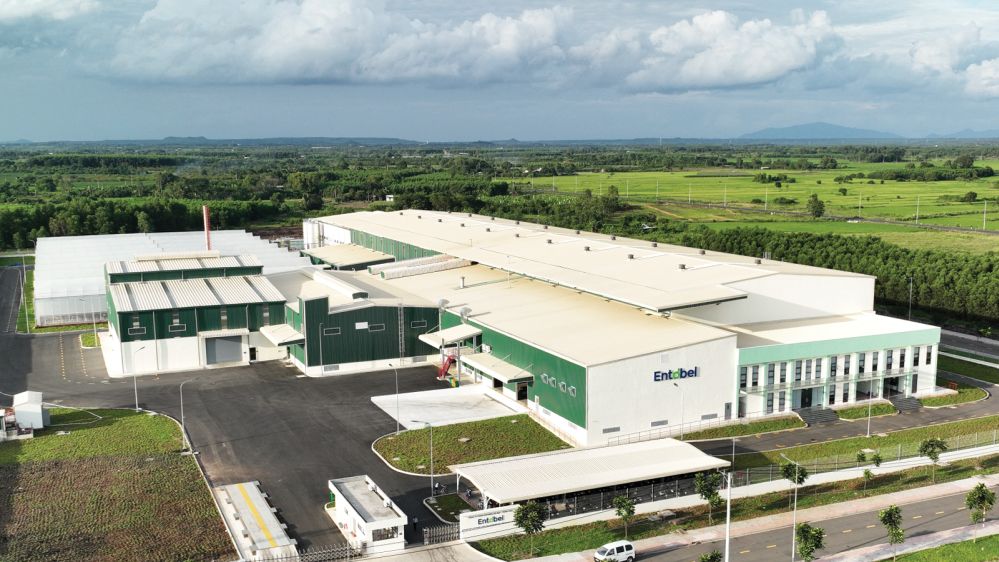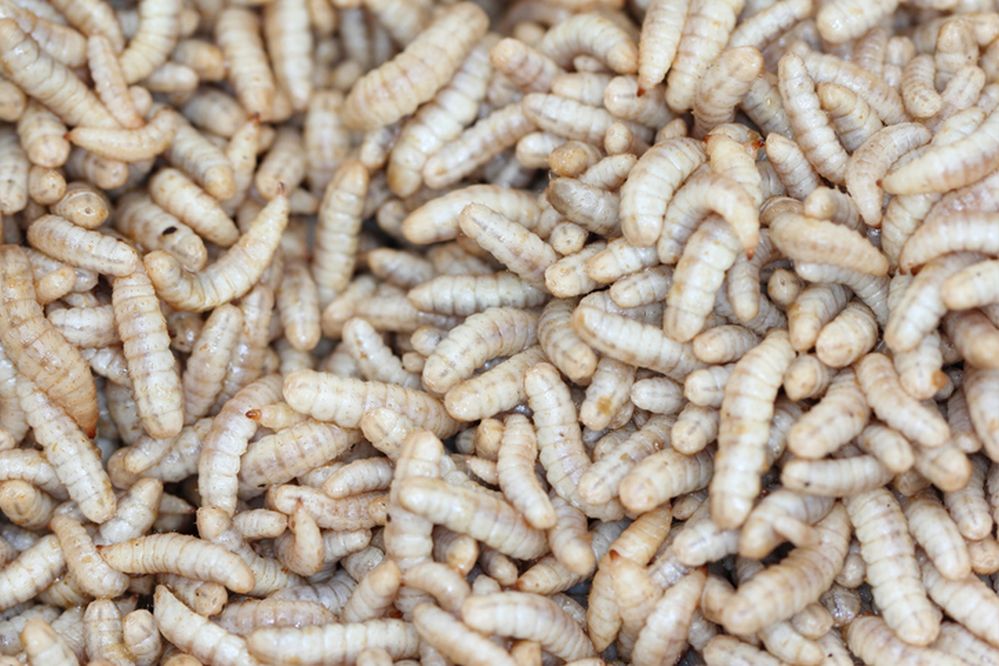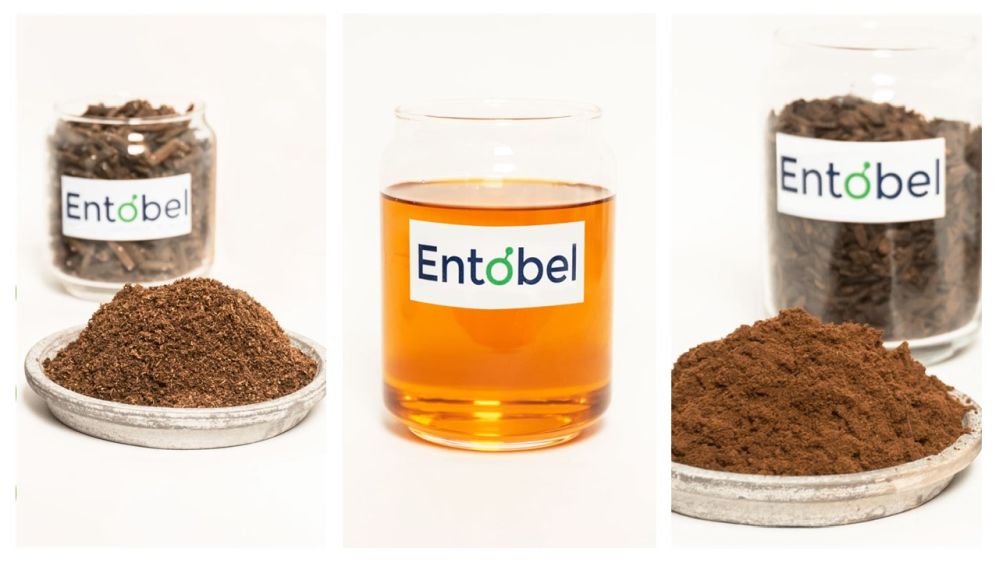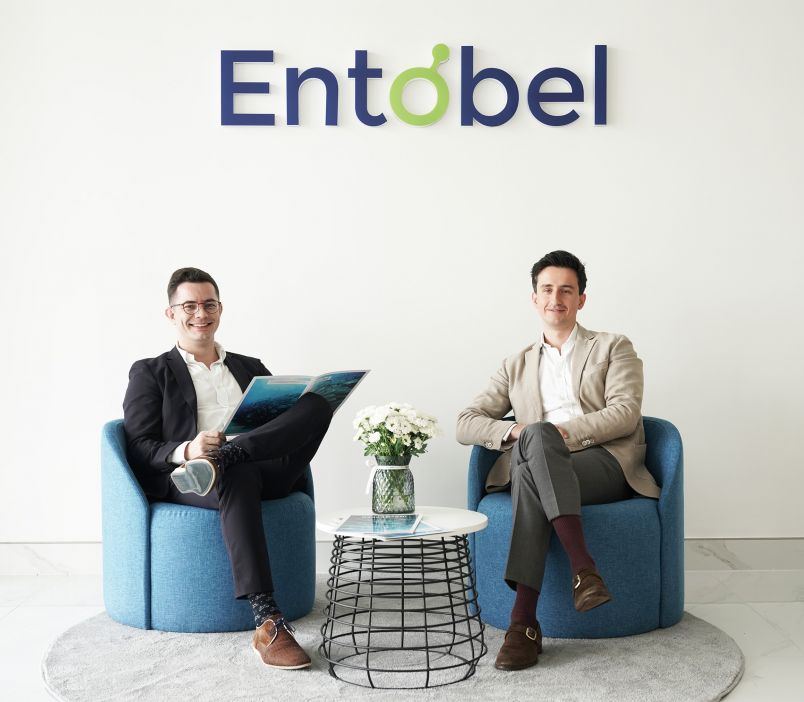Singapore-based Entobel has opened a black soldier fly larvae (BSL) production facility in Vietnam capable of producing 10,000 tons of protein meal a year.
The facility, billed by Entobel as “the world’s most CAPEX-efficient BSF production facility,” produces protein meal, oil, and fertilizer (insect frass/waste), and is “one of the largest insect production facilities in the world, and for sure in Asia,” cofounder Alexandre de Caters told AgFunderNews.
To place this in context, Innovafeed’s BSL production facility in Nesle, France, can make 15,000 tons of protein a year, while Aspire’s plant in Canada is ramping up to produce 12,000 tons of cricket protein a year. Meanwhile, Cricket One’s new cricket plant in Vietnam has an initial capacity of 1,000 tons that the founders hope to expand to 10,000 tons over the next five years.
“Big feed companies in Vietnam have been testing our products for the past four years on everything from shrimp to sea bass and pigs,” said de Caters. “They know our capabilities, so they have just been waiting for volume to be available.”
He added: “The insect protein industry was quite trendy a few years ago, and there were some big funding rounds in Europe. And then I think the industry disappointed a little bit in that milestones were not achieved. So at Entobel we’ve stayed under the radar and focused on execution, not making too much noise until we had something to say. But I hope that now, it’s time for Entobel to shine a bit more and demonstrate it’s possible to produce industrial volumes of insect protein at a competitive cost.
“We expect this factory will be profitable early next year.”
CFO Sandy Singh Sandhu added: “Investors have seen a lot of capital not achieving very much in this space, milestones missed and not a lot of de-risking of the technology. But when they see what we’ve done, there’s both shock and appreciation and they want to learn more.”
Entobel’s decade in insect ag
- 2013: Alexandre de Caters and Gaëtan Crielaard move from Belgium to Vietnam to start insect farming.
- 2015-17: Pilot plant up and running
- 2018: Series A funding
- 2019: 1,000-tons/year demo plant up and running in Dong Nai province, Vietnam
- 2022: $30 million series B ($25 million from Mekong Enterprise Fund IV and $5 million from Dragon Capital) plus $2.5 million from The International
Finance Corporation (IFC), to fund larger-scale production; partnership with animal nutrition specialist Adisseo to optimize feeding regime. - 2023: Commercial-scale plant opens in Ba Ria Vung Tau, Vietnam, capable of producing 10,000 tons of protein meal per year. The site has created 150 jobs in manufacturing and operations and features “50 levels of vertical rearing, incorporating automation via robotics, cutting-edge sensors and data analytics that enhance productivity.”

Pressure on aquaculture industry to reduce reliance on fishmeal
Founded by de Caters and fellow Belgian entrepreneur Gaëtan Crielaard in 2012, Entobel has spent a decade learning how to farm and process insects in the most efficient manner in order to translate these learnings into progressively larger facilities, said de Caters.
“We built our first commercial facility in 2019, so we’ve been producing at industrial scale and supplying the aquaculture industry for four years, which I see as a big strength of the company. We made our mistakes before we started operating at very large scale, so we didn’t burn through a lot of money.
“We faced a lot of challenges around controlling the environment in the growing rooms, setting up the right ventilation systems airflow control, and heat distribution, but we’ve taken those learnings and incorporated them at the new site, where there is a lot more automation, and we are a lot more energy efficient.”
According to de Caters, who has raised around $36 million over the past decade: “Farming insects at scale is very challenging, but there is more and more pressure on the aquaculture industry to reduce what we call ‘fish in, fish out,’ and I think over time, we’ll only become more competitive, because we see the trend of fishmeal prices going up.”
Entobel has not yet pre-sold the entirety of the projected output from the new plant, but has commitments for a “meaningful percentage,” says de Caters.

‘We took a one-way flight to Vietnam aged 23’
But how did two Belgians end up in Vietnam in the first place?
“In the early days, no one was doing this at scale, or they were looking at human foods, where we felt there wasn’t much of a market,” said de Caters. “So we realized that to really have an impact, we needed to focus on the animal feed market with black soldier fly larvae, as it’s one of the most efficient insects in terms of bioconversion [converting feed into food].
“But it quickly became obvious that Europe was not the place to start for the simple reason that black soldier flies are tropical insects. The other major factor [behind moving to Vietnam] is that aquaculture, which is centered in southeast Asia, is one of our biggest markets.
“So we took a one-way flight to Vietnam aged 23 with no experience of working with insects, just what we knew from reading scientific papers. We then worked on a farm in the Mekong Delta for more than a year to really learn everything about insects. What do they eat? How do they convert food into their body weight? What is the quality of the protein? How do we breed them efficiently?”
Just because black soldier flies aren’t too picky about what they eat, for example, doesn’t mean you should feed them any old thing just to save money, noted de Caters. “You need something very consistent so you can produce a consistent product, so for this plant we are located close to two Heineken breweries [from which Entobel can secure a steady supply of spent grains as a key source of feedstocks for its insects].”
After the larvae grow for about a week, they are mechanically separated from the frass, which is sold to farmers as fertilizer to provide a nutrient boost to soil. The larvae is then dried and crushed to extract the oil, which is sold to the animal feed markets (aquaculture and pigs).
The “very palatable” and “highly digestible” protein has a relatively well-balanced amino acid profile, enabling firms to use it to replace a significant percentage of fishmeal in their feed, said de Caters. “In aquafeed, trials show better palatability and increased feed intake, better growth performance, and anti-microbial properties.”
Asked about future plans, Entobel is planning to launch a series C round in the first half of 2024, he said: “We plan to grow further inside Vietnam, but the bigger facilities would likely be outside Vietnam in countries with tropical weather and a stable supply of feedstock such as Indonesia and Malaysia.”

Further reading:
🎥Insectta: ‘We envision a future where insects power healthcare and electronics’
Brief: Tyson bets on insect protein with strategic investment in Protix
Edible insect startup Cricket One closes series A, opens Asia’s largest cricket processing facility
Insect protein giant Ÿnsect targets profitability with a new CEO and new company strategy
Aspire Food Group ramps up world’s largest cricket production facility, scouts for 2nd site





